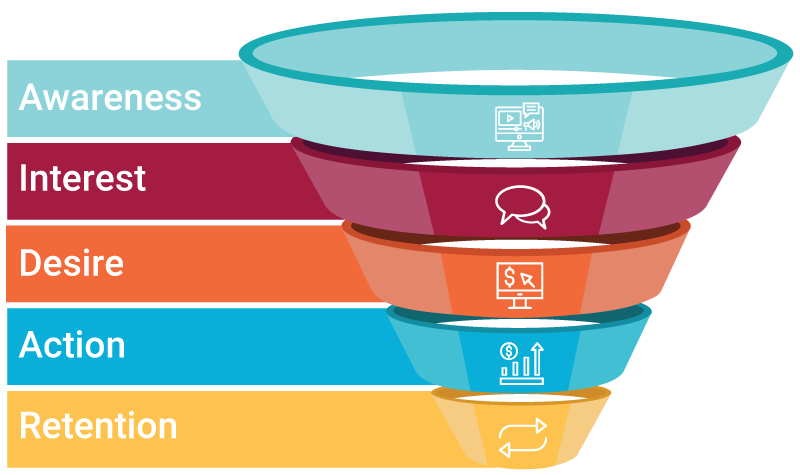
![]() Insights
Insights
While the channels used in B2B and B2C marketing are the same, B2B businesses face different challenges which means what marketing tactics work for B2C may not be effective for B2B.
Adjusting both your wider marketing strategy and your channel-specific strategies can help to overcome these challenges and grow your business online.
In this blog we will highlight the differences in B2B and B2C and why these need to be considered when creating a B2B PPC strategy.
The audience for B2B businesses is a lot smaller than most B2C businesses: there are more consumers searching for jeans than there are sales directors looking for new sales software. This means that B2B queries will typically receive lower levels of search volume which is important to remember when setting KPIs.
Despite having less traffic, the CPC for some B2B industries can be extremely high – for example, in highly competitive industries such as web hosting, or for businesses where the products or services come at a high premium. Unlike B2C, B2B broad keywords with low commercial intent can also have a high CPC as they typically have lower quality scores, and due to competition, which forces more brands to target broader terms.

The B2B sales cycle is lengthier than most B2C sales cycles, with a cycle often taking months to years rather than days to weeks. This is for a few reasons:
There is a lot of going back and forth along the B2B customer journey. Each decision maker will look at different companies, clicking on ads and organic listings of multiple options multiple times and getting quotes for various contenders so they can make an informed decision. This should be reflected in the CTAs used in your ads – it’s rare that someone is able to make a decision there and then, so messages of urgency aren’t as effective in B2B as they are in B2C. All these factors mean that conversion rates for B2B campaigns are usually lower than for B2C, something which should be factored into your goals and KPIs.
Moving away from a last click attribution model to a model which looks at the value of every touchpoint in the customer journey is crucial as it allows marketers to gain a better understanding of the customer journey and how different channels lead to conversion.
Many B2C industries only need to measure and track the value of a sale to optimize campaigns for better performance but in B2B, this can be much more complex as they need to track leads as well as sales.
It is extremely important for B2B businesses to analyze the leads they get and use this data to optimize their campaigns. Leads may be online, but they may also be offline – phone calls can be an important lead generation tool for B2B and need to be tracked accordingly. There are multiple tools available to do this, from Google Ads’ phone tracking system to third-party tools like ResponseTap.
Once you have identified leads which need to be tracked, you can set up a system which feeds back the lead quality into Google Ads or Search Ads 360 as this allows you to adjust bids to target high-quality leads in both manual and automated bidding. While some platforms, such as Salesforce, offer native integrations to allow this feedback system, it is also possible to build bespoke solutions that link offline sales and leads into Google Analytics and then Google Ads.
Most B2B purchases require the input of several individuals or departments, particularly for high cost and high strategic purchases, such as a digital marketing agency or high value, essential equipment, as these solutions impact multiple areas of a business. The more stakeholders involved in the buying decision, the less likely it is that you will make a sale as you have to tick the boxes for each and every individual.
When creating a digital marketing strategy for your B2B business, you need to identify all the decision makers and ensure you have content across the full marketing funnel for everyone involved. Your PPC strategy will need to include targeting for each decision maker, ensuring that the relevant messaging is pushed in front of every stakeholder; for example, a finance director would want to know the financial benefits, while a marketing director would want to know about the features which will improve their marketing.
More often than not, the motivation behind a B2C purchase is emotive. People buy things they believe will make their lives better; less stressed, or more interesting, for example, so ad copy is better suited focusing on the benefits of a product.
The purchase motivation for B2B is much more complex, as it needs to take both the company’s needs and the individual’s needs into consideration.
Motivation can be rational – is this purchase a sound financial investment for the business? How will it decrease costs/ free up time/ make money/ help the business reach its goals? Individual decision makers will also want to ensure that a purchase makes their jobs easier or more satisfactory before they are willing to approve the purchase.
Motivation can also be emotional on a company and an individual level. Every individual weighing in on the decision will have their own emotional needs, while the company itself will have a set of values that needs to be taken into consideration when making a purchase.
Both emotional and rational motivations will need to be considered when crafting your ads and landing pages. Product features, tangible benefits, social proof, and company credibility should all be easy to identify.
Understanding the differences between the customer and customer journey for B2B and B2C will help you to craft an effective B2B PPC strategy which brings in high-quality leads.
This blog is part of our wider B2B Playbook that is designed to help B2B businesses with all aspects of their digital marketing from leveraging data, acquiring more traffic, creating assets that resonate and succeeding internationally.
In the traffic section. we take a look at your paid search and organic methods to grow your reach to get the right traffic to turn into more conversions.
Need help managing your B2B PPC?Get in touch with our team

![]() Insights
Insights

![]() Insights
Insights

![]() Insights
Insights